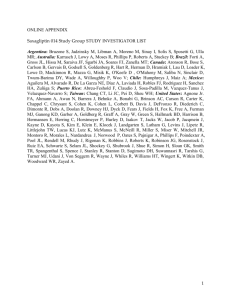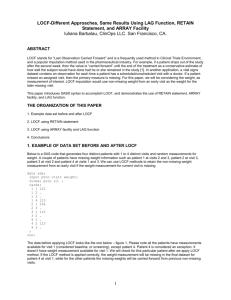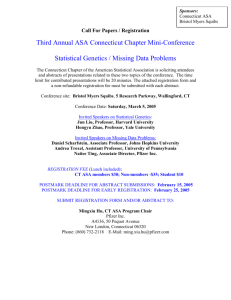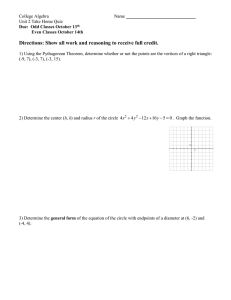LOCF and MMRM: Thoughts on Comparisons Raymond J. Carroll Texas A&M University
advertisement
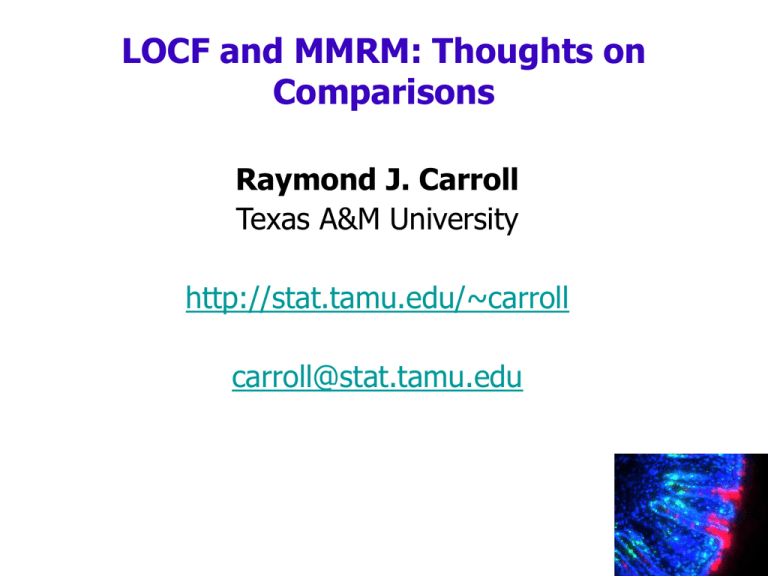
LOCF and MMRM: Thoughts on Comparisons Raymond J. Carroll Texas A&M University http://stat.tamu.edu/~carroll carroll@stat.tamu.edu Outline • Brief rehash of the talks comparing LOCF and mixed models • Defense of LOCF as a clinically relevant endpoint • Conclusions Bob O’Neill • “In protocol planning, assume that monotonic missing data, if it occurs, is likely informative”, at least depending on treatment • At the very least, this means missing at random (MAR) • It makes no sense (to me!) to use as a primary analysis a method that is known to fail under the simplest MAR conditions. Bob O’Neill • Problem: “how to specify in the protocol the primary strategy for dealing with missing data - if you presume that it will be informative - and you have not observed the data yet” • “Decide what data will be collected that will allow for conditioning on factors that matter to address bias adjustments” • Message to me: the more and better data that is gathered, the simpler the analysis that can be reasonably specified. Bob O’Neill • “There is NO strategy which is adequate for all different combinations of dropout mechanisms, drop-out rates or less similar courses of disease and no adequate recommendations can be given” • Amen! Bob O’Neill • “Decide what data will be collected that will allow for conditioning on factors that matter to address bias adjustments” • In addition, “If possible, collect data on all subjects until the trial is completed, even if withdrawn from trial” • I’d say: try to collect data after dropout! • The fact is that investigators can, with enough effort and expense, collect more data post dropout: a major point in what follows Geert Mohlenberghs and Craig Mallinckrodt: LOCF versus Mixed Models • LOCF essentially never theoretically justified for endpoint and baseline comparisons, since as Bob O’Neill says, MAR or worse is the rule • Difficult to understand why it is used for this purpose • Mixed Models are theoretically justified under readily explicated assumptions • Mixed model software makes it possible to write a priori defined protocols Review of LOCF versus Mixed Models • Mixed models less sensitive to informative missingness (NMAR) than LOCF • There is no single, nor can there ever be a single analysis for NMAR data (Bob O’Neill makes this point as well) • Investigators should strive to collect data on dropouts, and follow them up. LOCF as a Clinically Relevant Endpoint • One defense of LOCF is that it is said to be measuring a clinically relevant endpoint, albeit a different one from what MMRM is measuring • We all know it is inappropriate for a endpoint/baseline comparison LOCF as a Clinically Relevant Endpoint • One defense of LOCF is that it is said to be measuring a clinically relevant endpoint, albeit a different one from what MMRM is measuring • That is, what is relevant is what the physician sees while the patient is in the study • Thus, the argument goes, this is not a matter of statistics, it is a matter of medical science • The argument sounds great, but is bogus LOCF as a Clinically Relevant Endpoint • LOCF in this sense violates the fundamental basis of statistics • When we compare populations, we compare them on the basis of a parameter • LOCF has no physical parameter, because its result (mean change) is subject to investigator manipulation (More later) • Thus, as a statistical method, LOCF makes no sense LOCF as a Clinically Relevant Endpoint • LOCF has no physical parameter, because its result (mean change) is subject to investigator manipulation • Specifically, what LOCF measures differs depending on how much effort is spent in obtaining follow up data LOCF as a Clinically Relevant Endpoint Placebo Investigators strive mightily to keep patients in the study or to follow them up No treatment effect Treatment Time Endpoint LOCF as a Clinically Relevant Endpoint Investigators skip follow up and lots of placebos drop out early (dashed line) Placebo Nice big treatment effect What is LOCF making inference about? No one knows! Treatment Time Endpoint Conclusions • Gather more data, either to make simpler analysis reasonable or to obviate need for NMAR analysis • Post dropout follow up? • The “clinically relevant endpoint” argument for LOCF is all hat and no cattle • No single NMAR analysis will ever exist
